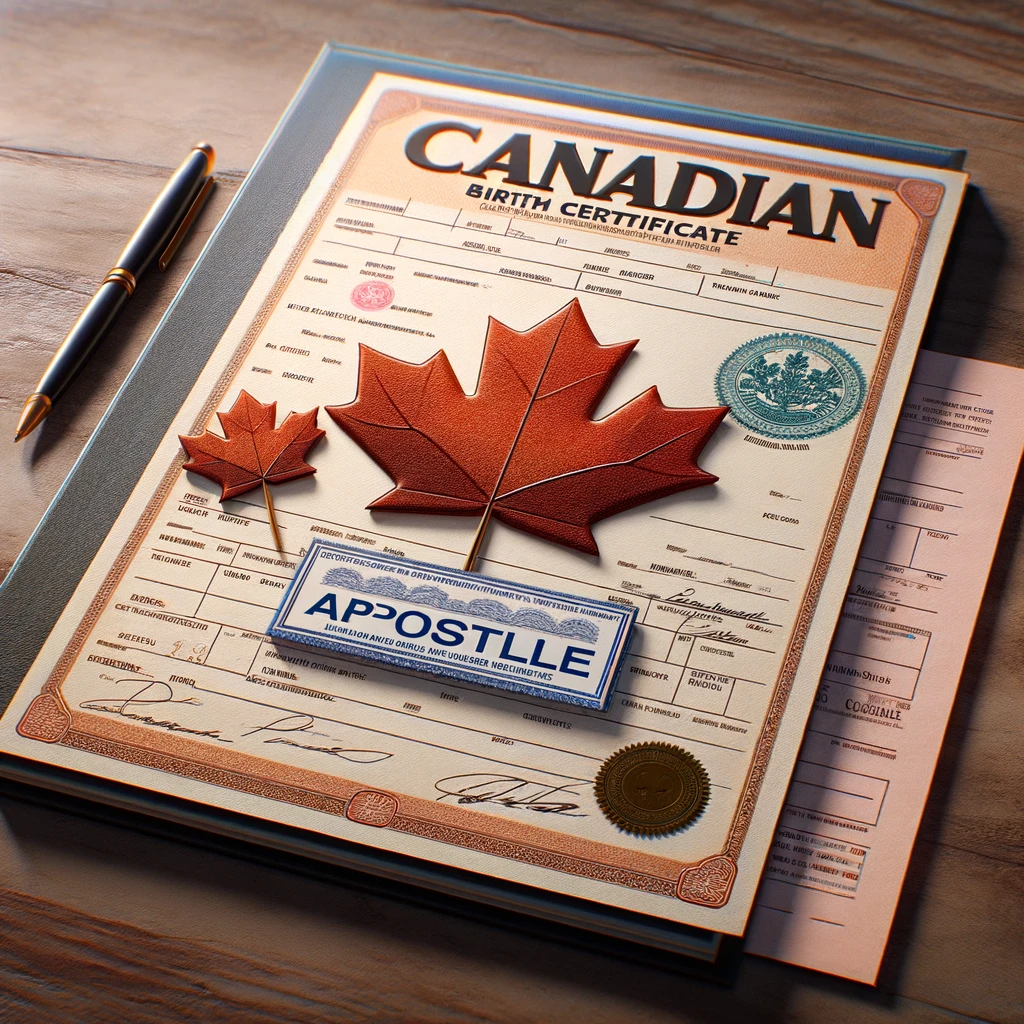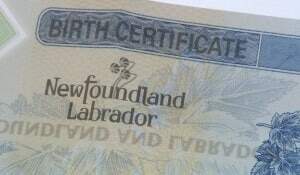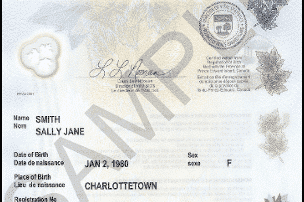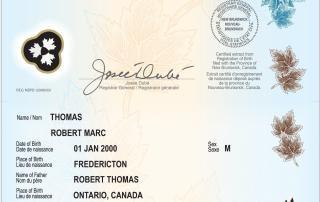Birth Certificate Apostille or Authentication Legalization
As of January 11 2024, Canada has joined the Hague Apostille Convention. For a Canadian Birth Certificate to be officially recognized in countries that are signatories to the Convention, it now requires only an apostille. This simplification streamlines the process significantly for use in these countries. However, for countries not part of the Convention, the traditional process of authentication followed by legalization at the embassy of the foreign country where it will be used, remains necessary.
Our team, with 30 years of experience, continues to assist individuals in both processes: obtaining an apostille for countries under the Hague Apostille Convention, and the authentication and legalization (equivalent to an apostille in non-signatory countries) for others. This service is essential for various purposes, including visa applications, immigration, marriage, birth registration in foreign countries, and employment abroad.
Why You May Need It
Apostilling, authenticating, and legalizing a Canadian birth certificate are important steps in international document verification. These processes ensure that a document issued in one country is recognized as valid and official in another. Here are some reasons why you might need to have your Canadian birth certificate apostilled, authenticated, and legalized:
- Working Abroad: If you are planning to work in a foreign country, employers may require an apostilled or authenticated birth certificate to verify your identity and nationality.
- Studying Overseas: Many international educational institutions require authenticated documentation for enrollment. This includes birth certificates, especially for programs that have age restrictions or need to verify your date of birth.
- Marriage in a Foreign Country: If you plan to get married abroad, the local authorities might require an apostilled or authenticated birth certificate to process marriage documents.
- Immigration Purposes: When applying for residency or citizenship in another country, a legalized birth certificate is often a necessary part of the application process to establish your identity and nationality.
- Legal Matters: For international legal cases, such as inheritance or custody disputes, an authenticated birth certificate might be required to establish relationships and nationalities.
- Business Transactions: For certain international business transactions or when establishing business operations overseas, company representatives may need to provide authenticated personal documents, including birth certificates.
- Adoption Processes: In international adoption processes, authenticated birth certificates of the adoptive parents are usually required as part of the dossier.
- Dual Citizenship: If you are applying for dual citizenship, many countries require an apostilled or authenticated birth certificate from your country of origin.
- Consular Needs: Sometimes, for dealings with a foreign consulate or embassy (like visa applications), you may need to present an apostilled or authenticated birth certificate.
- Driver’s License or ID Applications Abroad: Some countries require an apostilled or authenticated birth certificate for issuing a driver's license or national ID to foreign nationals.
How do I get an Apostille for a Canadian Birth Certificate?
The process of apostille, authentication, and legalization essentially verifies the legitimacy of the document for international use, ensuring it is recognized in countries that are members of the Hague Apostille Convention or have bilateral agreements with Canada. Each country has its own requirements and procedures, so it's important to understand the specific needs of the country where you intend to use the document.
Make Sure You Have the Right Birth Certificate for the Process
It is vital to have the right type and size of Birth Certificate. Visit our Document Resources page for details on ordering a new birth certificate from provincial government vital statistics departments. Some departments provide direct delivery to our office for expedited processing.
Choosing the Correct Government Service for You
The other crucial step is choosing the correct process for the apostille or authentication of your Canadian Birth Certificate to ensure its validated correctly for international use. This step can be confusing as it depends on what province it was issued in as it could be Global Affairs Canada or one of the designated provincial authorities.
Global Affairs Canada Apostille or Authentication Services
Global Affairs Canada is responsible for the apostille or authentication of Birth Certificates issued in specific provinces and territories. It is important to note that Birth Certificates from these provinces should be processed by Global Affairs Canada.
Provincial Apostille or Authentication Services
Certain Provincial Competent Authorities will be responsible for the apostille or authentication of birth certificates issued in their respective regions. These include Alberta, British Columbia, Ontario, Quebec (subject to government approvals) and Saskatchewan. Although there are exceptions to the rule if the document is a notarized copy or upon other factors which is another great reason to hire a professional service, so you get it right the first time.
Birth Certificate Authentication and Legalization for Non-Apostille Countries
1
Step 1: Authentication
The first step of authentication takes place at the respective competent authority. They will verify the certificate style, live birth registration, and the new type of Birth Certificate on polymer paper. However, the wallet-sized birth certificate cannot be authenticated as it is too small. In this case, you must order a new larger Birth Certificate from the provincial vital statistics department. Our team will help you determine if you have the correct type of Birth Certificate for authentication.
It is advisable to start the authentication process at Global Affairs Canada as soon as possible, as the wait time is longer than ever before. You can check the current processing time for Global Affairs Authentication here.
2
Step 2: Legalization
The second step of legalization takes place at the embassy or consulate of the foreign country, where a fee is charged for document legalization services. Our document legalization services will ensure that your birth certificate meets all requirements and is legalized correctly and efficiently, and we can return it to you or anywhere in the world it needs to go.
How Does Using Global Document Solutions Services Benefit You?
Utilizing a professional service for the apostille or authentication of birth certificates offers significant advantages. Professionals are well-versed in the intricacies of these processes, ensuring that your documents comply with all legal requirements. This reduces the risk of errors and delays, which can be crucial for time-sensitive matters. When these tasks are not handled by experts, there's a higher likelihood of mistakes such as improper documentation or missing critical steps, leading to prolonged processing times or outright rejection. In the realm of official documentation, accuracy and adherence to protocols are paramount, and professional services provide the expertise and peace of mind that these aspects are thoroughly managed. Talk to one of our experts today!
FAQ’s
List of Countries you will need to use the Authentication and Legalization Process for a Canadian Document
For your reference, we have provided a list of countries that have not ratified the Apostille Convention. It is your responsibility to verify the accuracy of this information.
- Afghanistan
- Algeria
- Angola
- Bangladesh
- Benin
- Bhutan
- Burkina Faso
- Cambodia
- Cameroon
- Central African Republic
- Chad
- Comoros
- Congo
- Côte d'Ivoire
- Cuba
- Democratic People's Republic of Korea
- Democratic Republic of the Congo
- Djibouti
- Egypt
- Equatorial Guinea
- Eritrea
- Ethiopia
- Gabon
- Gambia
- Ghana
- Guinea
- Guinea-Bissau
- Haiti
- Iran
- Iraq
- Jordan
- Kenya
- Kiribati
- Kuwait
- Lao
- Lebanon
- Libya
- Madagascar
- Malaysia
- Maldives
- Mali
- Mauritania
- Micronesia
- Mozambique
- Myanmar
- Nauru
- Nepal
- Niger
- Nigeria
- Papua New Guinea
- Qatar
- Rwanda*
- Sierra Leone
- Solomon Islands
- Somalia
- South Sudan
- Sri Lanka
- Sudan
- Syria
- Thailand
- Timor-Leste
- Togo
- Turkmenistan
- Tuvalu
- Uganda
- United Arab Emirates
- Tanzania
- Viet Nam
- Yemen
- Zambia
- Zimbabwe
* The Apostille Convention will come into effect in Rwanda on June 5, 2024.
The process of preparing a document for international recognition can be significantly complicated by the legalization phase. This critical juncture is a specialty of ours at Global Document Solutions, where our three decades of industry experience come into play. Even for us, with our extensive diplomatic connections, keeping abreast of the ever-evolving legalization requirements imposed by different countries can be demanding. The unpredictability is due to the frequent changes in embassy requirements and regulations. In such a dynamic environment, the key to avoiding missteps is to have a professional like Global Document Solutions Legalization Services by your side. We guarantee that you'll always receive the most current information and the focus your international affair necessitates. It's clear that delays can lead to increased costs, wasted time, and unnecessary stress. Therefore, we prioritize our clients, understanding the potential ramifications of delays, and we are committed to resolving any issue swiftly and effectively. Our exemplary customer service is one of the many reasons why Global Document Solutions should be your first choice for legalization services. Besides saving you time, we provide the peace of mind that comes from knowing that Canada’s top international document experts are diligently working on your behalf.
You can avail of Global Document Solutions Legalization services from anywhere globally, or by visiting one of our Global Document Solutions Service Centers situated throughout Canada. To find out more, simply visit our website and utilize our Cost Estimator or contact us toll-free at 1-800-336-1132 from Monday to Friday, between 9 AM to 5 PM. Our friendly representatives at our Ottawa National Office are always ready to assist. If you prefer using one of our Global Document Solutions Service Centers, we typically require a one-hour notice to schedule an appointment. After that, you are all set to drop off your Global Document Solutions order form, documents, and any necessary embassy requirements at the most convenient Global Document Solutions Service Center. Our reception staff will be prepared to expedite your document to our National Office in Ottawa for processing. Rest assured, we'll promptly update you via email once your document has been received at our Ottawa National Office for legalization. The email will include a file number allowing you to track the progress of your order using our Order Status Tracker. It truly is as simple as that!
This is a question that comes up often as some hope to save time or expense throughout the Legalization process and at Global Document Solutions we understand this. There are a select few countries where you can legalize your document outside of Canada. In most of these cases, it’s because the country does not have an embassy operating within Canada. Some countries only have an Embassy in the United States such as Oman or Bahrain, and some other countries use the system of partnering Country to process their documents, such as St. Maarten or Andorra. As such in most cases, you will need to have your document legalized at the country’s embassy located in Canada.
The reason is that the legalization process is a process of verifying signatures, the Embassy verifies the stamp and signature from Global Affairs Canada. All Embassies within Canada have the signatories on file but only a few embassies or agencies outside Canada have their signatures on file, which they require to legalize Canadian documents. Only embassies in the issuing country will have these signatures and be able to legalize a document. Unfortunately, some of our clients find this out once they arrive in destination country, costing them valuable time and money. Get it right the first time, speak to one of our legalization experts about your Canadian document and getting it ready for us internationally.
Legalization processing time is dependent on the specific embassy which varies widely from country to country. The Legalization processing times are in addition to the Global Document Solutions authentication service speed that you choose. Your agent will provide you what the current estimated legalization processing time is when you confirm the use of our services. As an example, the current processing time for the Embassy of Mexico for legalization is 5-9 business days. Unfortunately due to Global Affairs Canada Authentication processing delays times are fluctuating weekly. You can find out the current estimated authentication processing times here. This estimate neither includes shipping time to our Ottawa Office nor back to you when the document is legalized by the embassy.
Although it’s important to remember that processing times for legalization can change without notice for many factors. These factors include such things as unexpected embassy closure, national holidays, embassy receiving a high volume of legalization requests, embassy signatory not available, your document is under further review, or needs additional requirements to name a few. Whatever the case may be, delays in processing cost both time and money. At Global Document Solutions we understand this, which is why our legalization services are the right choice for your important international document.
No, although we wish we could, unfortunately, we do not provide legalization services at all embassies in Canada for various reasons. Although Global Document Solutions 30 years of experience working with the embassies for legalization, which makes Global Document Solutions the preferred provider for international document processing in Canada, we cannot help with every country. This is due to reasons such as country regulations insisting that the applicant must do the legalization step themselves or in cases where we cannot guarantee the service provided by the embassy or consulate is a high enough quality. This may occur for various reasons such as political tensions between countries, no consulate is operating, or requirements change too often which is not feasible for us to provide a swift and economical legalization solution for our clients. The countries that we currently do no assist with the legalization of documents include:
Azerbaijan – No personal or corporate documents
Georgia – No personal or corporate documents
India – No personal or corporate documents unless you are a resident in Ottawa or Montreal
Lithuania – No personal or corporate documents
North Korea – No personal or corporate documents
Oman - No personal
Saudi Arabia – No personal
Somalia – No personal or corporate documents
Syria – No personal or corporate documents
Venezuela - No personal or corporate documents
Come back and check as this list changes often. We may begin providing legalization services for the countries listed above at any time in the future.
No, we wish we could but unfortunately, we are just the authentication and legalization experts which means our job is to ensure that you get the right stamps on your document to make it valid for use internationally. Although we do help verify your document to ensure it will be accepted at both Global Affairs Canada and the countries embassy this is where our expertise ends. Since each situation and country has different document requirements, depending on what you are using your document for, it is best to get directions from your in-country contact who is asking you to legalize your Canadian documents. This way you get it right the first time with no delays or possibility of having an incorrect document legalized for the purposes that you need.
For example, our clients often may need what is called a long-form birth certificate as opposed to the usual short-form birth certificate most people are familiar with. Another is with police checks which come up often as most countries require that you obtain one from the RCMP using a digital fingerprint search with their national headquarters in Ottawa as opposed to your local police force. As previously mentioned, it’s important to get it right the first time, so we recommend you ask the right people which are the people who are requesting that you have your Canadian documents legalized.





